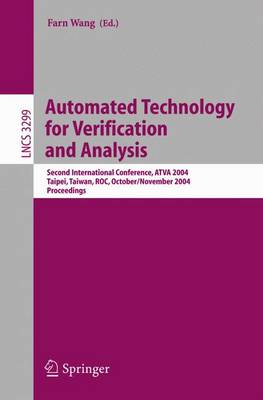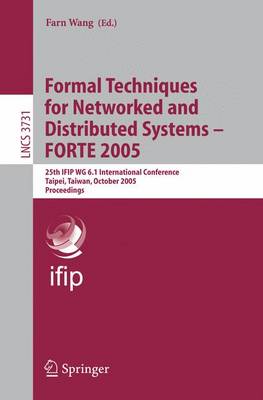Lecture Notes in Computer Science
2 primary works
Book 3299
It was our great pleasure to hold the 2nd International Symposium onAutomated Te- nology on Veri?cation and Analysis (ATVA) in Taipei, Taiwan, ROC, October 31- November3,2004.TheseriesofATVAmeetingsisintendedforthepromotionofrelated research in eastern Asia. In the last decade, automated technology on veri?cation has become the new strength in industry and brought forward various hot research activities in both Europe and USA. In comparison, easternAsia has been quiet in the forum.With more and more IC design houses moving from SiliconValley to easternAsia, we believe this is a good time to start cultivating related research activities in the region. TheemphasisoftheATVAworkshopseriesisonvariousmechanicalandinformative techniques, which can give engineers valuable feedback to fast converge their designs according to the speci?cations. The scope of interest contains the following research - eas: model-checking theory, theorem-proving theory, state-space reduction techniques, languages in automated veri?cation, parametric analysis, optimization, formal perf- mance analysis, real-time systems, embedded systems, in?nite-state systems, Petri nets, UML, synthesis, tools, and practice in industry.
Book 3731
Formal Techniques for Networked and Distributed Systems Forte 2005
by Farn Wang
Published 1 January 2005
FORTE (Formal Techniques for Networked and Distributed Systems) 2005 was sp- sored by Working Group 6.1, Technical Committee 6 (TC6) of the International Fed- ation for InformationProcessing (IFIP).The conferenceseries started in 1981underthe name PSTV (ProtocolSpeci?cation, Testing, and Veri?cation).In 1988,a second series under the name FORTE was started. Both series merged to FORTE/PSTV in 1996. The conference name was changed to FORTE in 2001. During its 24-year history, many important contributions have been reported in the conference series. The last ?ve me- ings of FORTE were held in Pisa (Italy), Cheju Island (Korea), Houston (USA), Berlin (Germany), and Madrid (Spain). The 25th FORTE was held from Sunday to Wednesday, October 2-5, 2005 on the beautiful campus of the National Taiwan University (NTU), Taipei, Taiwan, ROC. The scope covered formal description techniques (MSC, UML, Use cases, ...), semantic foundations, model-checking, SAT-based techniques, process algebrae, - stractions, protocol testing, protocol veri?cation, network synthesis, security system analysis, network robustness, embedded systems, communication protocols, and s- eral promising new techniques.
In total, we received 88 submissions and accepted 33 regular papers and 6 short papers. All submissions received three reviews. The ?nal program also included 3 keynote speeches, respectively by Prof. Amir Pnueli, Dr. C- stance Heitmeyer, and Prof. Teruo Higashino, and 3 tutorials, respectively by Prof. Rance Cleaveland, Dr. Constance Heitmeyer, and Prof. Teruo Higashino. The proce- ings also include the text of the keynote speeches. In addition, there were social events, including a reception, a banquet, and an excursion.
In total, we received 88 submissions and accepted 33 regular papers and 6 short papers. All submissions received three reviews. The ?nal program also included 3 keynote speeches, respectively by Prof. Amir Pnueli, Dr. C- stance Heitmeyer, and Prof. Teruo Higashino, and 3 tutorials, respectively by Prof. Rance Cleaveland, Dr. Constance Heitmeyer, and Prof. Teruo Higashino. The proce- ings also include the text of the keynote speeches. In addition, there were social events, including a reception, a banquet, and an excursion.

